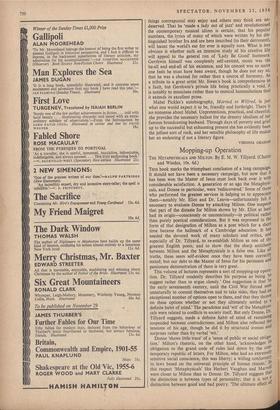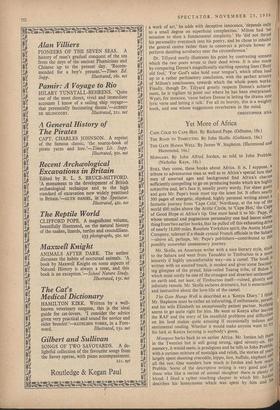Mopping-up Operation
This book marks the triumphant conclusion of a long campaign. It should not have been a necessary campaign, but now that It has been won the Master of Jesus must look back over it with considerable satisfaction. A generation or so ago the Metaphyst- cals, and Donne in particular, were 'rediscovered.' Some of those who performed the greatest services in helping us to appreciate them—notably Mr. Eliot and Dr. Leavis—unfortunately felt It necessary to evaluate Donne by attacking Milton. One suspects that part of the distaste for Milton shown by Mr. Eliot at least had its origin—consciously or unconsciously—in political rather than purely poetical considerations. But it was expressed in the form of that denigration of Milton as a poet which for a short time became the hallmark of a Cambridge education. It has needed the devoted work of many scholars and critics, and especially of Dr. Tillyard, to re-establish Milton as one of the greatest English poets; and to show that the sharp antithesis between Milton and the Metaphysicals is a false one. Like all truths, these seem self-evident once they have been correctly stated; but our debt to the Master of Jesus for his persistent and passionate demonstration of them is very great.
This volume of lectures represents a sort of mopping-up opera' tion. Dr. Tillyard modestly describes his purpose as being Id suggest rather than to argue closely.' One suggestion is that the early seventeenth century, until the Civil War forced men unnaturally to commit themselves and to take sides, they had an exceptional number of options open to them, and that they throve, on these options whether or not they ultimately settled to a definite habit of mind.' The paradoxes and `wit' of the MetaphYsl" cats were related to conflicts in society itself. But only Donne, Dr. Tillyard suggests, made a definite habit of mind of remaining suspended between contradictions; and Milton also reflected the, tensions of his age, though he did it by structural ironies and surprises rather than by verbal 'wit.'
Donne 'shows little trace' of a 'sense of public or social obliga' tion.' Milton's rhetoric, on the other hand, 'acknowledges its obligation to the grand code of rules laid down by the con' temporary republic of letters. For Milton, who had an extremely sensitive social conscience, this was liberty; a willing conformitY to laws based on the universal principle of human reason.' 1,9 this respect `Metaphysicals' like Herbert Vaughan and Marvel' were closer to Milton than to Donne. Dr. Tillyard suggests that the distinction is between types of personality; that it is not 3, distinction between good and bad poetry. 'The ultimate effect 01 a work of art,' he adds with deceptive innocence, 'depends only to a small degree on superficial complexities.' Milton had 'no occasion to shun a fundamental simplicity.' He 'did not thrust his personality overmuch into his poetry, and he chose to inhabit the general centre rather than to construct a private bower or perform dazzling acrobatics near the circumference.'
Dr. Tillyard neatly illustrates his point by contrasting sonnets which the two poets wrote to their dead wives. It is also made by comparing Donne's magnificently startling opening lines (`Busy old fool,' For God's sake hold your tongue'), which often lead up to a rather perfunctory conclusion, with the perfect artistry of Milton's conclusions, towards which the whole poem works. Finally, though Dr. Tillyard greatly respects Donne's achieve- ment, he is vigilant to point out where he has been overpraised. Wyatt, for instance, 'came before Donne in letting the drama into lyric verse and letting it talk.' For all its brevity, this is a weighty book, and one whose suggestions reverberate in the mind.
CHRISTOPHER HILL,











































































 Previous page
Previous page